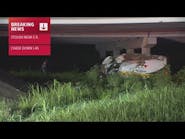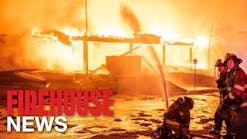Fire Service Organizations Respond to Study Failing to Link Firefighting and Cancer
Various fire service organizations are responding to a study released two weeks ago by the National League of Cities claiming there is inadequate scientific research to determine a link between firefighting and cancer.
The 174-page document titled "Assessing State Firefighter Cancer Presumption Laws and Current Firefighter Cancer Research," was prepared by research firm TriData.
Yesterday, the IAFF and IAFC came out with a joint statement, calling the study "tobacco industry-style tactics" from a group they say has fought every piece of presumptive legislation the two organizations have worked to pass.
Currently, 28 states and seven Canadian provinces have presumptive laws in place recognizing that firefighters work in an environment that exposes them to carcinogens and places them at an increased risk of developing certain cancers.
Several times, the statement refers to a 2006 study released by the University of Cincinnati that found protective equipment used in the past did not adequately protect firefighters from cancer-causing agents encountered during the job. The IAFF's spokesman Jeff Zack says this study -- along with over 200 other studies that document chemicals found on the fireground that lead to cancer -- shows there is ample evidence to link firefighting to cancer.
"We wouldn't call it (the NLC report) a study. It doesn't rise to the level of a study. It's pure propaganda," he said. "For the National League of Cities to think this is a worthwhile effort is dumbfounding"
The IAFC later that day released findings from a panel convened by its Safety, Health and Survival Section citing "flawed methodology" in the report.
"If the National League of Cities is truly concerned about evaluating this issue 'objectively and scientifically' as they stated in their press release, then they need to look at all the data in a scientifically sound manner," IAFC President Chief Larry J. Grorud said in a statement.
Today, the USFA release a less aggressive statement advising firefighters to continue to avoid exposure to such toxins which may cause cancer.
"The results of this report clearly indicate that more study and analysis is necessary," Acting United States Fire Administrator Glenn A. Gaines said. "It is much too early to abandon presumptive laws and benefits for firefighters who present with cancers. To make such a quantum leap at this point in time may be premature."
The statement said the NLC study is missing necessary information and that future research "must recognize the myriad dangers faced by firefighters throughout our country." The USFA went on to say that it is willing to assist with any new research efforts.
Mike Dubron, the president and founder of the Firefighter Cancer Support Network said that he was disappointed to see the report come out, but hopes it will help shine a spotlight on an issue he's worked to bring awareness to.
The Los Angeles firefighter was diagnosed with colorectal cancer in 2003, and after having it surgically removed he has been cancer-free for six years. California does have a presumptive law and his cancer was deemed to be job related; allowing him to seek the best medical options.
"That was huge," he said. "It's sad because there are firefighters out there that don't have presumption in their states because they may not be getting the best medical options."
Dubron says his organization's mission will continue to be supporting active and retired firefighters and their families dealing with cancer.
"We only hope that people out there who don't have knowledge of what we do understand that this study is not accurate according to studies we've seen in the past," he said. "In the long run, as we see other studies released it will only reinforce what we already know -- that firefighters are exposed to carcinogens that lead to cancer."





